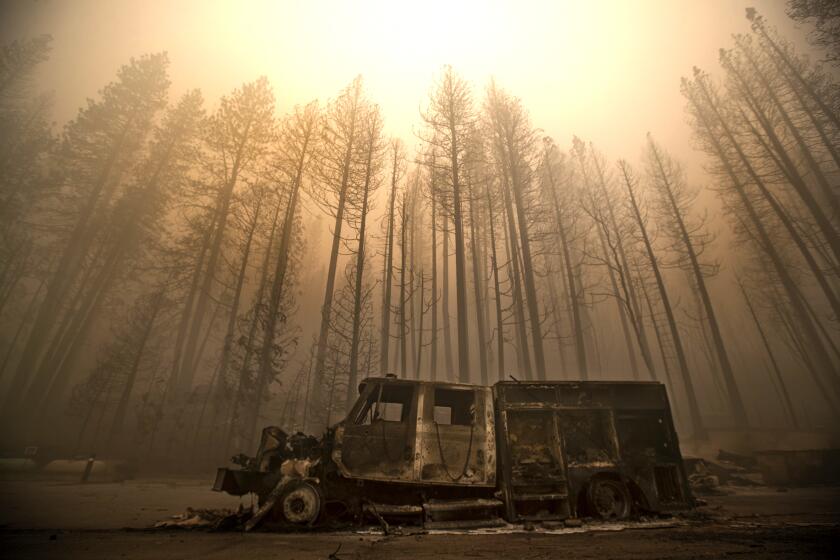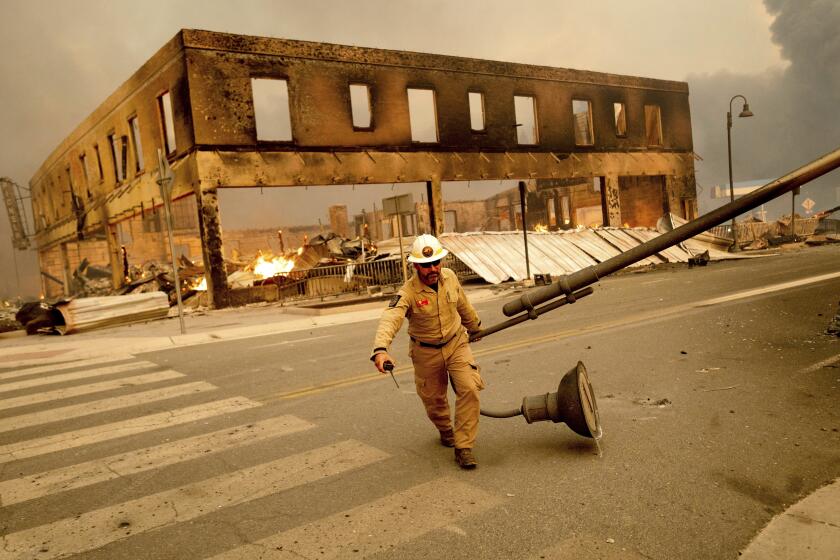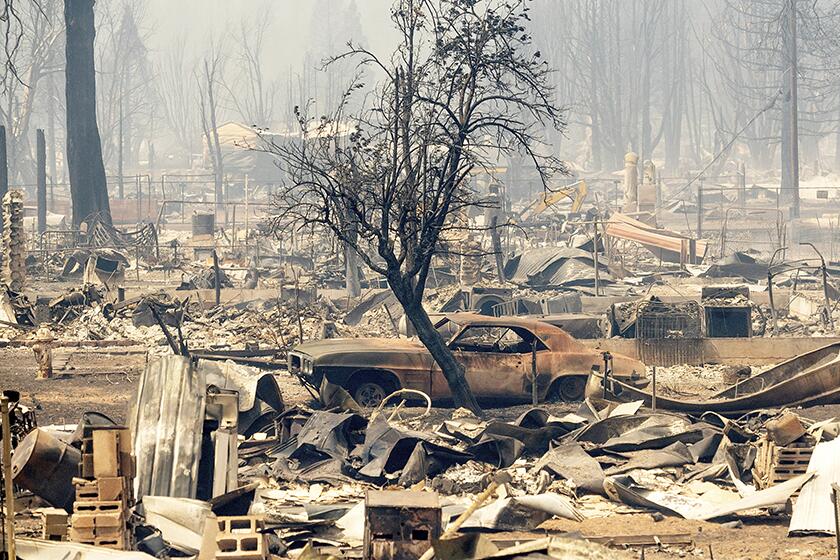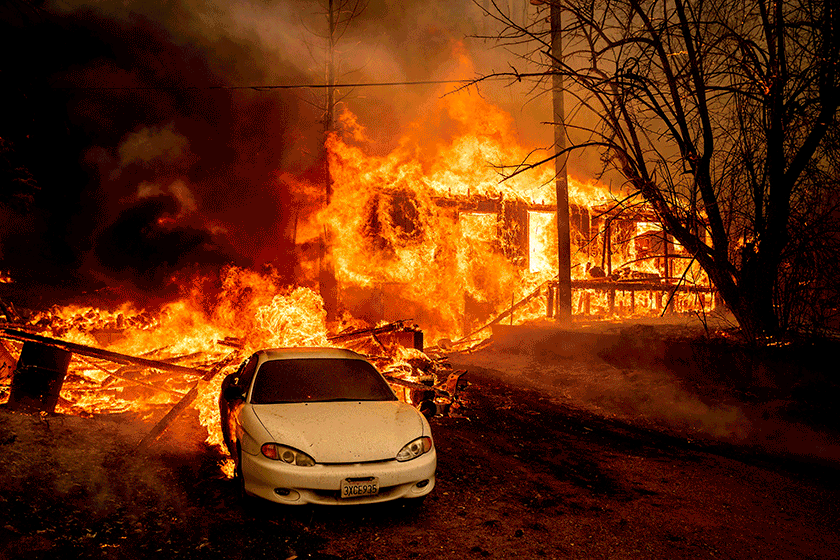As Dixie fire nears half a million acres, containment is still weeks away

The Dixie fire, now the second-largest blaze in state history, has burned more than 463,000 acres and destroyed more than 400 buildings.
- Share via
It has been 26 days since the Dixie fire ignited in the dense forest of Plumas County. It has destroyed more than 400 structures and sent tens of thousands of residents fleeing for safety.
And officials are warning that it could take several more weeks to contain the monstrous blaze, which is the second-largest wildfire in California’s recorded history.
The fire grew to 489,287 acres Monday and was only 21% contained, the California Department of Forestry and Fire Protection said. The estimated date for containment is Aug. 30.
Early in the week, the Dixie fire continued to grow and the River fire burned homes north of Sacramento.
“It’s all based on fire weather conditions,” Cal Fire incident spokesman Edwin Zuniga said, noting that the heat, dryness and gusty winds that have stoked the fire’s growth show little signs of improvement in coming days.
After more favorable conditions over the weekend, temperatures in Northern California near the fire are expected to climb back into the high 90s by Wednesday and could reach triple digits, the National Weather Service said.
Last week, gusty red flag conditions sent embers from the Dixie fire flying into tinder-dry terrain, causing the blaze to explode by nearly 150,000 acres in less than two days.
That rapid growth is what caused containment numbers to plummet from 35% to 21%, Zuniga said.
The destruction by the Dixie fire of a large swath of the Gold Rush town of Greenville left residents stunned and mourning all that has been lost.
More than 16,000 structures remain threatened by the blaze, Cal Fire officials said. Experts have said that dry vegetation leads to more intense fires that move faster and are harder to fight.
During a visit to the Dixie fire burn zone Sunday, Gov. Gavin Newsom said it took only about 90 minutes for the conflagration to rip through the community of Greenville, reducing most of the small town to ash and rubble.
“The extreme weather conditions ... are leading to extreme conditions and wildfire challenges the likes of which we’ve never seen in our history,” Newsom said. “And as a consequence, we need to acknowledge, just straight up, these are climate-induced wildfires.”
Last month was the hottest July on record in four Western states, including California, according to the National Weather Service.
More than 5,800 firefighters are working around the clock to battle the Dixie fire, said Dan McKeague, an incident spokesman with the U.S. Forest Service. Exhausted crews are being swapped out for new ones.
And although the thick layer of smoke hovering over the fire is expected to dissipate Monday, McKeague said clearer skies actually expose the fire to more dangerous heat from the sun, which could lead to increased fire activity.
“It was actually helpful,” he said of the thick smoke. “It sort of held a cap that blocked some of the sunlight.”
If the fire activity flares up as expected Monday, he said, crews could see 200-foot flame lengths that force them to retreat. And the warming trend expected later in the week will add to challenging conditions, he said.
The Dixie fire, now the second-largest blaze in state history, has burned more than 463,000 acres and destroyed more than 400 buildings.
Evacuation orders and warnings spurred by the Dixie fire remained in effect Monday across swaths of Plumas, Butte, Tehama and Lassen counties.
The Lassen County Sheriff’s Office on Sunday issued new evacuation warnings for portions of the Janesville area.
The Dixie fire is one of 11 major fires burning across the state, according to Cal Fire.
One blaze, the lightning-sparked Monument fire in Shasta-Trinity National Forest, grew to 53,019 acres and was 3% contained Monday, the U.S. Forest Service said.
Evacuation orders for that fire have been issued in portions of Junction City, Red Hill, Canyon Creek, Coopers Bar, Big Bar, Del Loma, Big Flat, Helena and Cedar Flat.
The Trinity County Sheriff’s Office issued new evacuation orders for the community of Burnt Ranch on Monday morning.
Officials say a perfect storm of conditions — the heat, the dry fuels, the drought, the wind, the slope — has driven the Dixie fire’s rapid spread.
The largest wildfire in California history is last year’s August Complex fire, which was composed of nearly 40 fires that ultimately grew to more than 1 million acres.
The largest stand-alone fire in the state is the Creek fire, which also ignited in 2020 and burned about 380,000 acres without ever merging with another fire, Cal Fire officials said.
Yet the Dixie fire, which merged with the smaller Fly fire in July, remains unlike anything officials have seen.
“Sometimes it can be mentally draining, because you’re out there for so long and it just becomes like Groundhog Day,” said Zuniga, who also helped battle the 2018 Mendocino Complex fire, which had been the state’s second-largest fire until the Dixie fire claimed the title.
With several more weeks of firefighting likely to come, Zuniga said, the priority on the Dixie fire remains defending lives and homes.
“We are focused on protecting every community that is being affected, or has the potential to be affected, by the fire,” he said. “Our main goal at this point is to not let another Greenville happen.”
More to Read
Sign up for Essential California
The most important California stories and recommendations in your inbox every morning.
You may occasionally receive promotional content from the Los Angeles Times.















